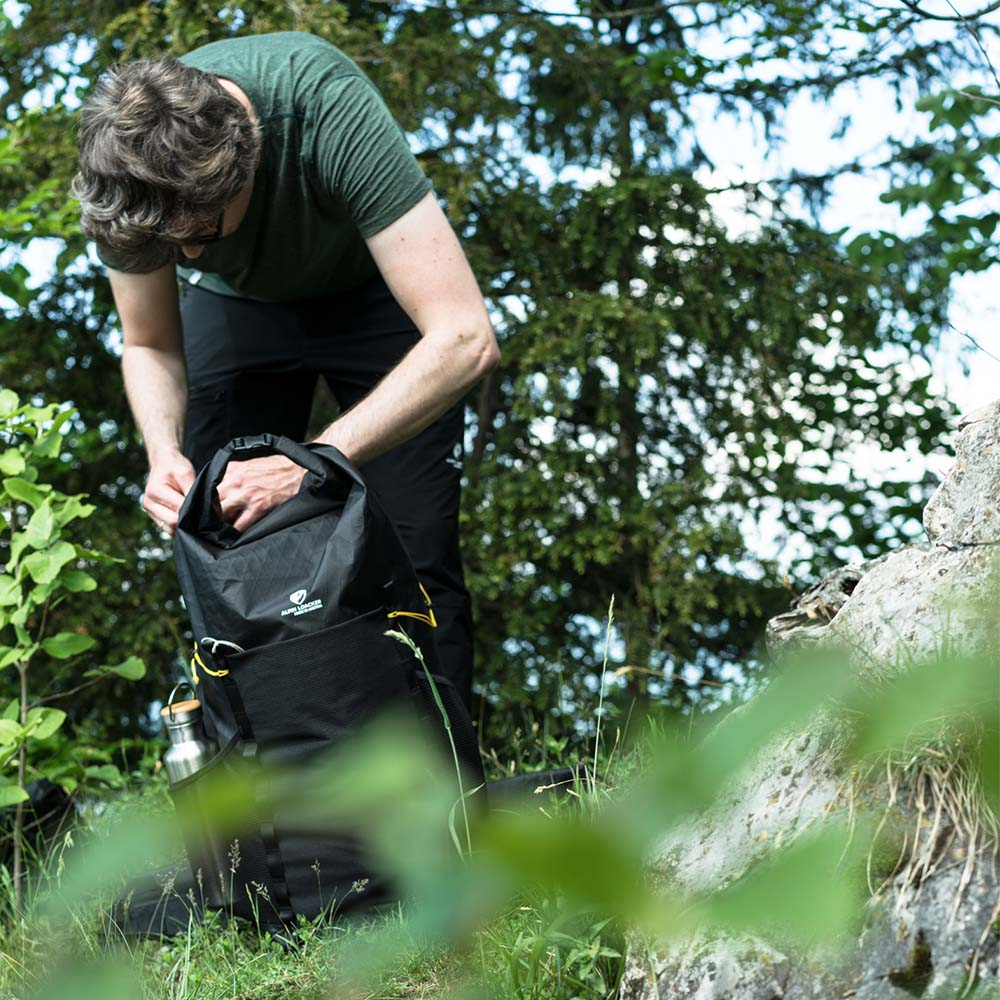The central question: Do I need a waterproof rucksack for the mountains? This question and the confusing terms of what the difference is between waterproof, water-resistant and water-repellent are clarified in this blog post about waterproof rucksacks.
What is the difference between waterproof, water-resistant and water-repellent?
Waterproof
Refers to the properties of materials and clothing that prevent water from penetrating or soaking through. If a backpack is described as waterproof, it must be 100 percent capable of keeping moisture out of the inside of the backpack.
When is something watertight?
There are different classes. They are classified as follows: According to the European standard EN 343, a product with a water column from 800 mm is "waterproof (class 1&2)", from 1300 mm "waterproof (class 3)", from 2000 mm "waterproof (class 4)".
When is a backpack waterproof?
The big difference between waterproof and water-resistant backpacks is the welded seams. Seams are often the weak point, allowing moisture through over time. In a 100% waterproof backpack, the seams are welded. However, this makes the backpack more expensive and heavier.

This mountain backpack from Alpin Loacker is waterproof and has no welded seams. The rucksack is therefore very light and weighs just 394g.
Waterproof
In comparison to waterproof fabrics, waterproof material lets water through - BUT only after a certain time!
When is something waterproof?
A backpack is waterproof or water-resistant if it can keep out moisture, but it cannot be ruled out that moisture will penetrate at some point. Water-resistant backpacks should normally keep water out of the inside of the backpack for a few hours.
How long does a waterproof hiking rucksack last before it gets wet?
A waterproof rucksack is suitable for hiking tours lasting several hours. However, if it pours down like a bucket, it can get wet.
You can make a rucksack waterproof with these two tools:
- Waterproof, that's right - actually waterproof materials, if they are not made of 100% waterproof material, are often made waterproof by impregnation.
- Take a rain cover for your rucksack if you are unsure about the weather. Rain covers for hiking rucksacks are available in different sizes. Sometimes a rain cover is already built into the backpack. In this case, it is often located in the lower part - the bottom of the rucksack.

If you put the rucksack in the baggage hold during a flight, a rain cover provides additional protection against wear and tear and dirt.
Water repellent
Water-repellent materials are materials that repel water so that it cannot penetrate. These materials usually have a coating that prevents moisture from getting inside. This coating is the water-repellent material. Waterproof and water-repellent are often used interchangeably. Water-repellent materials are less robust than waterproof materials.
When is a backpack water-repellent?
Every outdoor backpack must have a certain water-repellent function, otherwise it would not be able to fulfill its purpose. The material must have a certain tensile strength and tear resistance. Materials for a water-repellent outdoor backpack must therefore have a certain basic robustness. This usually consists of a tear-resistant material that can hold weight over a long period of time without losing its elasticity and without absorbing water.
A hiking rucksack can withstand light rain for up to 2 or 3 hours. Then it starts to soak through. It is advisable to use a rain cover right from the start to prevent moisture getting into the rucksack.

Almost all outdoor backpacks that are not waterproof or water-resistant are water-repellent. Except for special lightweight backpacks, which allow water to penetrate immediately.
Tip: If you don't have a completely waterproof backpack, use a waterproof drybag for electronic items such as your cell phone and camera.

A drybag or pack sack protects your electronic devices from getting wet.
When do I absolutely need a waterproof backpack?
You should definitely use a waterproof rucksack for the following 2 activities:
- For climbing: Waterproof backpacks for climbing are extremely durable because they have to withstand the rock for as long as possible. They are usually made from truck-like tarpaulins such as TPU or similarly robust materials.
- For biking: Most rucksacks and bike bags are now completely waterproof. There is not only the threat of moisture from above and from the side, but also dirt and mud from the ground.

Backpacks that are dragged along the rock must be extremely robust.
Urban area and daily use
If you travel by bike all year round and transport electronic devices such as laptops and cell phones, you have the following options:
You can either choose a completely waterproof backpack with taped seams or a waterproof backpack, i.e. a backpack where the material is waterproof but does not have taped seams. It is very important that you choose a backpack that is rolled up from the top and is not opened and closed with a zipper. The backpack should have no unnecessary seams. Like many modern models, a kind of no-frills "sack" is best suited to this. This has the advantage that it is light and you don't have to carry around unnecessary backpack weight.

Lightweight and waterproof backpack for everyday use or day trips.






